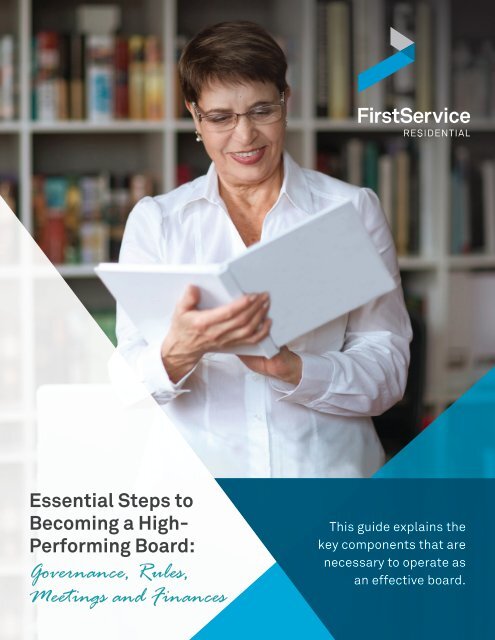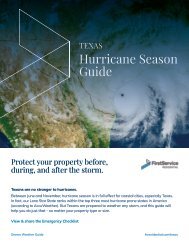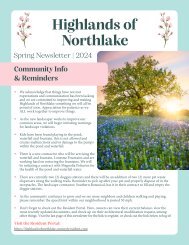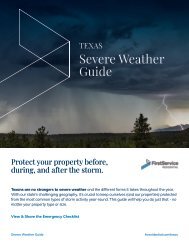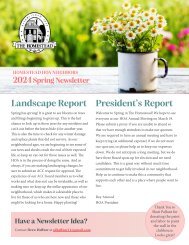Essential Steps to Becoming a High-Performing Board
This guide explains the key components that are necessary to operate as an effective board.
This guide explains the key components that are necessary to operate as an effective board.
Create successful ePaper yourself
Turn your PDF publications into a flip-book with our unique Google optimized e-Paper software.
<strong>Essential</strong> <strong>Steps</strong> <strong>to</strong><br />
<strong>Becoming</strong> a <strong>High</strong>-<br />
<strong>Performing</strong> <strong>Board</strong>:<br />
Governance, Rules,<br />
Meetings and Finances<br />
This guide explains the<br />
key components that are<br />
necessary <strong>to</strong> operate as<br />
an effective board.
<strong>Essential</strong> <strong>Steps</strong> <strong>to</strong> <strong>Becoming</strong> a<br />
<strong>High</strong>-<strong>Performing</strong> <strong>Board</strong>:<br />
Governance, Rules, Meetings and Finances<br />
<strong>High</strong>-performing boards do not just collaborate and operate perfectly overnight.<br />
As a group of volunteers — made up of new members who are often learning about their<br />
roles, and long-time board members who might need a refresher on the basics — boards<br />
need <strong>to</strong> be developed in<strong>to</strong> efficient teams that improve their communities.<br />
As outlined in the guide, Developing a <strong>High</strong>-<strong>Performing</strong> <strong>Board</strong>: Alignment, Planning and<br />
Training, <strong>to</strong> be effective, board members should first align and create a community vision.<br />
But once the board understands the scope of their roles and is aligned on goals for the<br />
community, how do they go about governing?<br />
They should begin executing their plan for the community by evaluating existing policies<br />
and adopting new policies if necessary. But before they proceed, they need <strong>to</strong> know the<br />
bylaws and covenants outlined in their governing documents, the rules and policies<br />
of the community, how <strong>to</strong> conduct meetings and how <strong>to</strong> review finances <strong>to</strong> gauge the<br />
community’s financial health.<br />
All these fac<strong>to</strong>rs affect what policies they will adopt, how they will support the community<br />
and what projects they will execute. These steps are pivotal for their success and <strong>to</strong><br />
perform as an effective board.<br />
With a clear outline of what their roles entail, what rules apply <strong>to</strong> the property and<br />
what operating principles apply <strong>to</strong> the board itself, board members can drive their<br />
community forward.<br />
This guide is an in-depth look at the following key components that are<br />
necessary for all members <strong>to</strong> be familiar with how <strong>to</strong> operate as an<br />
effective board:<br />
» Governance<br />
» Finances &<br />
» Rules & Policies<br />
Reserves<br />
» Meetings<br />
CONTENTS<br />
Governance &<br />
Governing Documents<br />
1<br />
Rules & Policies<br />
Meetings<br />
Finances & Reserves<br />
2<br />
3<br />
4
FIRSTSERVICE RESIDENTIAL GUIDE<br />
Governance &<br />
Governing Documents<br />
When new members join the board,<br />
they must familiarize themselves with<br />
the community’s governing documents,<br />
which give the board structure and the<br />
ability <strong>to</strong> govern, guiding them through<br />
operations and laying down regulations<br />
for the community. These guidelines<br />
also drive the board legally, making sure<br />
that they stay within the parameters of<br />
municipal ordinances, state statutes<br />
and federal laws.<br />
The governing documents also serve as<br />
a guide <strong>to</strong> the property management<br />
company that partners with the<br />
community. They’re also a reference for<br />
residents or homeowners, who often<br />
question why specific rules and policies<br />
exist in the community.<br />
The governing documents may include:<br />
» Articles of Incorporation:<br />
Corporations and developers must file<br />
articles of incorporation <strong>to</strong> operate in<br />
the United States and Canada, and<br />
the board must include that filing<br />
within its governing documents. They<br />
establish the community as a nonprofit<br />
mutual benefit corporation. The<br />
articles of incorporation must be filed<br />
with the state that the community<br />
is registered in and define the<br />
association’s legal name, address and<br />
corporate status.<br />
» Rules and Policies: The governing<br />
documents outline how the<br />
board must adopt new rules and<br />
regulations. Rules and policies<br />
provide a standard framework for<br />
all residents <strong>to</strong> follow and preserve<br />
property value and resident lifestyle.<br />
Rules usually include communityspecific<br />
policies such as parking,<br />
pets, noise complaints, trash and<br />
recreation/common areas. All<br />
regulations must stay consistent<br />
with the governing documents, and in<br />
some cases, cannot be established<br />
without a homeowner vote. Before<br />
a board implements new rules<br />
The governing<br />
documents also<br />
serve as a guide<br />
<strong>to</strong> the property<br />
management<br />
company that<br />
partners with the<br />
community.<br />
3 | <strong>Essential</strong> <strong>Steps</strong> <strong>to</strong> <strong>Becoming</strong> a <strong>High</strong>-<strong>Performing</strong> <strong>Board</strong>: Governance, Rules, Meetings and Finances www.fsresidential.com
FIRSTSERVICE RESIDENTIAL GUIDE<br />
or revises existing ones, they should get<br />
feedback from their at<strong>to</strong>rney <strong>to</strong> ensure that<br />
the new regulations are compliant with state<br />
laws.<br />
» Declaration: Sometimes called the<br />
proprietary lease, master lease or occupancy<br />
agreement, this document governs all aspects<br />
of the relationship between the community<br />
and the residents. It lists the residents’<br />
rights, occupancy and subletting privileges,<br />
maintenance costs, fac<strong>to</strong>rs for default or<br />
termination of the lease and rules for selling<br />
shares. It also contains the covenants,<br />
conditions and restrictions (CC&Rs).<br />
» Covenants, Conditions and Restrictions<br />
(CC&Rs): While rules and regulations can<br />
be changed easily, any modifications <strong>to</strong><br />
CC&Rs require a board vote, and then they<br />
must be re-filed with the state. CC&Rs<br />
establish residents’ rights and the rules<br />
that pertain <strong>to</strong> the land the community<br />
was developed on, outlining architectural<br />
standards, assessments and lot and property<br />
restrictions. CC&Rs must be filed with the<br />
state and are legally binding and permanent.<br />
They also state maintenance and insurance<br />
obligations and rule enforcement.<br />
Why are these<br />
important?<br />
Understanding the community’s<br />
governing documents allows board<br />
members and property managers<br />
<strong>to</strong> answer residents’ questions,<br />
make informed decisions and<br />
govern effectively. It also allows<br />
them <strong>to</strong> review policies and update<br />
them or create better policies<br />
based on community needs.<br />
» Bylaws: These measures establish the<br />
operational structure within the board<br />
and outline the board of direc<strong>to</strong>rs’ power.<br />
They address board member duties,<br />
responsibilities, elections and voting, how<br />
many meetings boards have annually and<br />
board members’ term limits. They also<br />
list specifics about board and resident<br />
interactions, the cadence of meetings and the<br />
specifics about the community finances. Like<br />
CC&Rs, the community’s bylaws also require<br />
a vote by the membership <strong>to</strong> amend.<br />
4 | <strong>Essential</strong> <strong>Steps</strong> <strong>to</strong> <strong>Becoming</strong> a <strong>High</strong>-<strong>Performing</strong> <strong>Board</strong>: Governance, Rules, Meetings and Finances www.fsresidential.com
FIRSTSERVICE RESIDENTIAL GUIDE<br />
Rules & Policies<br />
Effective boards that are in alignment have an easier<br />
time establishing and changing rules because they<br />
have a plan for the community and can guide their<br />
policy-making. When board members are familiar with<br />
the governing documents, they should be ready <strong>to</strong><br />
review and adopt new rules and resolutions as needed<br />
or required <strong>to</strong> address challenges in the community.<br />
Rules and Resolutions should:<br />
» Maintain/enhance common and recreational areas<br />
» Improve residents’ safety and quality of life<br />
» Protect property value and homeowners’ interests<br />
When establishing new rules, it is also essential<br />
<strong>to</strong> assess their long-term impact and value. What<br />
outcomes does your board expect? Are these goals<br />
achievable? <strong>Board</strong> members should make sure that<br />
new regulations solve problems, not exacerbate them.<br />
<strong>Board</strong>s create rules through amendments, and new<br />
rules mustn’t supersede the governing documents,<br />
municipal codes, ordinances or state laws. In most<br />
cases, the board can create rules and regulations<br />
without approval from the residents, but they should<br />
consider the residents’ input via meetings. When<br />
adopting new policies, the community’s concerns<br />
can give board members feedback about what issues<br />
matter the most <strong>to</strong> the community.<br />
Generally, boards implement rules that center around<br />
safety and maintenance and address community<br />
issues impacting residents’ quality of life. The<br />
more common rules regulate parking guidelines,<br />
pet restrictions, trash and recycling. They also set<br />
decoration and maintenance standards, and home<br />
occupancy and rental restrictions. Some rules can<br />
also pertain <strong>to</strong> new safety pro<strong>to</strong>cols for amenities and<br />
common areas based on health mandates or natural<br />
disasters.<br />
For example, a community might have a rule limiting<br />
the number of parking spaces available <strong>to</strong> each<br />
unit, which effectively addresses excessive parked<br />
cars in areas that block access for other community<br />
members. Or a community with limited green spaces<br />
might have a rule about pet size/weight limits <strong>to</strong> avoid<br />
overuse and pet waste in common areas. These rules<br />
protect residents’ quality of life and property value<br />
and help <strong>to</strong> keep areas clean and safe.<br />
5 | <strong>Essential</strong> <strong>Steps</strong> <strong>to</strong> <strong>Becoming</strong> a <strong>High</strong>-<strong>Performing</strong> <strong>Board</strong>: Governance, Rules, Meetings and Finances www.fsresidential.com
FIRSTSERVICE RESIDENTIAL GUIDE<br />
Rules may be added <strong>to</strong>, amended or repealed at any<br />
time by the board. Rules are usually recorded at a<br />
board meeting in the form of a motion called a policy<br />
resolution. A board can pass four different types of<br />
resolutions:<br />
» Policy Resolutions – These resolutions affect owners’<br />
rights and obligations, usually about common areas,<br />
recreational areas, enforcement and architectural<br />
guidelines. We recommend that boards get community input<br />
before voting on new policy resolutions <strong>to</strong> get resident buy-in,<br />
which helps with compliance down the line.<br />
» Administrative Resolutions – These resolutions encompass<br />
the board’s operations, meeting locations, finances and other<br />
administrative functions.<br />
» Special Resolutions – These resolutions address specific<br />
policies, particular violations, authorizations of lawsuits and<br />
exemptions.<br />
» General Resolutions – Resolutions that address board<br />
decisions regarding routine procedures like annual budget<br />
adoption and contract approvals.<br />
While it is essential <strong>to</strong> know how <strong>to</strong> adopt new rules when<br />
needed, it’s also prudent for the board <strong>to</strong> revisit old rules and<br />
regulations and make sure that they still serve their intended<br />
purpose and are relevant. Because communities are constantly<br />
growing and evolving, it is part of a board’s responsibility <strong>to</strong><br />
make sure that the community’s rules evolve.<br />
In some cases, state laws will change the community’s need for<br />
specific rules, or an emergency will spur the need <strong>to</strong> implement<br />
new regulations for residents’ safety. It is best <strong>to</strong> revisit your<br />
rules and regulations annually <strong>to</strong> review that they are<br />
not outdated.<br />
Why is this<br />
important?<br />
Understanding how and when <strong>to</strong> draft new<br />
policies and update established policies is<br />
essential <strong>to</strong> operating as an effective board. Not<br />
only does it allow members <strong>to</strong> ensure that the<br />
rules are not outdated, but it helps them keep<br />
residents safe, increase property value and<br />
improve quality of life.<br />
6 | <strong>Essential</strong> <strong>Steps</strong> <strong>to</strong> <strong>Becoming</strong> a <strong>High</strong>-<strong>Performing</strong> <strong>Board</strong>: Governance, Rules, Meetings and Finances www.fsresidential.com
FIRSTSERVICE RESIDENTIAL GUIDE<br />
Meetings<br />
An association must hold meetings with homeowners<br />
or their elected representatives <strong>to</strong> conduct the<br />
community’s business. Most bylaws require a certain<br />
number of sessions <strong>to</strong> be held annually and open <strong>to</strong><br />
all members. These meetings are vital as they provide<br />
members the opportunity <strong>to</strong> communicate their<br />
concerns and participate in the community’s decisionmaking<br />
process. They are also important as they allow<br />
the board <strong>to</strong> adopt policies that help protect and<br />
enhance the property.<br />
Meetings are conducted by a set of procedural rules<br />
outlined in the governing documents and by state law.<br />
These procedural rules dictate who can call meetings,<br />
who can attend meetings and the rules of order during<br />
meetings. The procedural rules also state who may<br />
speak and when, who controls the agenda and how <strong>to</strong><br />
call a vote.<br />
To have effective meetings, board members should<br />
review materials beforehand and come prepared,<br />
follow a schedule and conduct meetings within an<br />
established timeframe — usually no more than<br />
90 minutes — <strong>to</strong> be successful. Effective boards<br />
will usually rely on an “action list” provided by their<br />
property manager that lays out the most important<br />
community items <strong>to</strong> discuss.<br />
There are several types of community meetings, as<br />
each addresses a particular need.<br />
» <strong>Board</strong> Meeting – A meeting of the board of direc<strong>to</strong>rs<br />
that is open <strong>to</strong> all residents. <strong>Board</strong> meetings provide<br />
residents with the opportunity <strong>to</strong> address issues<br />
and participate in the process. <strong>Board</strong> meetings<br />
usually follow a set agenda and new business is<br />
not allowed unless an open forum is specified in<br />
the governing documents. During board meetings,<br />
the board reviews issues impacting the community<br />
like maintenance or resident disputes, and board<br />
members set policies and vote on business<br />
discussed in executive sessions. The board also<br />
reviews operations and sets the framework for<br />
future projects. Minutes of these meetings are kept<br />
and made available <strong>to</strong> residents.<br />
– If a board is in alignment and operating effectively,<br />
their meetings run efficiently, focusing on<br />
enhancing the community and property values.<br />
Suppose a community’s meetings are not running<br />
successfully because there is miscommunication,<br />
in-fighting and the sessions are running long. In<br />
that case, it may be a sign that the board is:<br />
7 | <strong>Essential</strong> <strong>Steps</strong> <strong>to</strong> <strong>Becoming</strong> a <strong>High</strong>-<strong>Performing</strong> <strong>Board</strong>: Governance, Rules, Meetings and Finances www.fsresidential.com
FIRSTSERVICE RESIDENTIAL GUIDE<br />
Why are meetings<br />
important?<br />
Meetings are essential <strong>to</strong> keeping the<br />
board and the residents in alignment <strong>to</strong><br />
get their buy-in and effectively govern.<br />
In communities where residents attend<br />
meetings and are a part of the policy-making<br />
process, boards report more compliance and<br />
fewer rule violations within the community.<br />
– On different sides of the same issue.<br />
– Unaware or lacking proper insight of relevant<br />
governing documents.<br />
– Not carefully considering long-term vs. short-term<br />
effects on the community.<br />
– Needs more practice in using rules <strong>to</strong> run a<br />
meeting. An experienced property management<br />
company can help boards align and be more<br />
effective in all of these areas.<br />
» Annual Meeting: One of the more important<br />
meetings a board can have, the annual meeting<br />
is open <strong>to</strong> all residents and is when the board<br />
discusses major <strong>to</strong>pics in the community. New<br />
board members are elected during the annual<br />
meeting, the budget is presented and the board<br />
announces upcoming capital projects.<br />
– Recently, some boards have shifted <strong>to</strong> conducting<br />
annual meetings virtually, allowing board<br />
members and residents <strong>to</strong> socially distance and<br />
conduct the important business of the community.<br />
Partnering with a property management company<br />
like FirstService Residential lends your board the<br />
resources <strong>to</strong> shift your annual meeting <strong>to</strong> a virtual<br />
setting.<br />
» Special/Town Hall Meeting: Occasionally, a board<br />
will hold a special session or a <strong>to</strong>wn hall <strong>to</strong> focus<br />
on a particular item of concern, an emergency<br />
or any other situation that requires immediate<br />
action. Special meetings are more informal and<br />
allow residents <strong>to</strong> communicate concerns and give<br />
suggestions and feedback before the board adopts<br />
a new rule. Because they are more resident-friendly,<br />
special meetings and <strong>to</strong>wn halls provide the board<br />
the opportunity <strong>to</strong> present large projects or<br />
sensitive or controversial measures <strong>to</strong><br />
all members and get immediate<br />
feedback, building consensus<br />
as a community.<br />
8 | <strong>Essential</strong> <strong>Steps</strong> <strong>to</strong> <strong>Becoming</strong> a <strong>High</strong>-<strong>Performing</strong> <strong>Board</strong>: Governance, Rules, Meetings and Finances www.fsresidential.com
FIRSTSERVICE RESIDENTIAL GUIDE<br />
Finances & Reserves<br />
<strong>Board</strong> members need <strong>to</strong> thoroughly<br />
understand and manage the<br />
community’s finances and reserves.<br />
As a fiduciary of the community,<br />
a board member is responsible<br />
for protecting assets, budgeting<br />
responsibly and observing all laws<br />
that regulate the community’s<br />
finances. <strong>Board</strong> members should<br />
review financial statements, reserve<br />
funds, studies and any audits <strong>to</strong><br />
assess the community’s financial<br />
health and set realistic goals for the<br />
future.<br />
A collaborative board engages in<br />
tactile, strategic planning and holds<br />
alignment meetings <strong>to</strong> develop a<br />
unified community vision. They<br />
understand the overall scope of the<br />
community’s finances in order <strong>to</strong><br />
make investments and decisions<br />
that yield long-term results.<br />
Successful boards create their<br />
community vision and have a plan on<br />
how <strong>to</strong> achieve that goal.<br />
Another aspect of long-term<br />
financial planning is <strong>to</strong> make<br />
sure that the community is<br />
adequately insured and ready<br />
for any situations that may arise.<br />
<strong>Board</strong> members should review the<br />
community’s insurance coverage<br />
annually <strong>to</strong> protect its assets and<br />
the association. With more and<br />
more communities experiencing<br />
damage from inclement weather or<br />
rushing water, making sure that the<br />
community is adequately insured<br />
has become a <strong>to</strong>p priority.<br />
<strong>Board</strong>s should also prioritize<br />
preventive maintenance within<br />
the community, as large repairs<br />
and construction directly<br />
impact a community’s finances<br />
and financial responsibilities.<br />
Preventive maintenance can<br />
make the difference between a<br />
minor repair and a large, costly<br />
one. Neighborhoods with strong<br />
management stay ahead of<br />
maintenance issues. It allows the<br />
community <strong>to</strong> keep the property in<br />
good working order, putting less<br />
stress on the community’s budget.<br />
While becoming familiar with the<br />
community’s finance is sometimes<br />
a significant undertaking, a board<br />
that partners with an experienced<br />
property management company<br />
has access <strong>to</strong> extensive accounting<br />
and financial resources <strong>to</strong> help<br />
protect the community and maximize<br />
investments.<br />
Partnering With the Right<br />
Property Management<br />
Partnering with an experienced<br />
property management company<br />
like FirstService Residential can<br />
give board members and residents<br />
guidance navigating governance,<br />
setting policies and finances.<br />
It also takes the demands of<br />
communicating directly with<br />
residents <strong>to</strong> answer questions,<br />
process applications and more,<br />
off the board. FirstService<br />
Residential has the resources and<br />
the experience <strong>to</strong> help your board<br />
transition in<strong>to</strong> a well-aligned team.<br />
For more information, visit www.<br />
fsresidential.com.<br />
Why it’s<br />
important:<br />
Assessing the community’s<br />
finances <strong>to</strong>day allows<br />
board members <strong>to</strong> plan for<br />
<strong>to</strong>morrow. Understanding<br />
the resources available in<br />
the community’s reserves<br />
enables them <strong>to</strong> plan large<br />
projects or implement new<br />
maintenance projects.<br />
9 | <strong>Essential</strong> <strong>Steps</strong> <strong>to</strong> <strong>Becoming</strong> a <strong>High</strong>-<strong>Performing</strong> <strong>Board</strong>: Governance, Rules, Meetings and Finances www.fsresidential.com
maintenance projects.<br />
About FirstService Residential<br />
FirstService Residential is North America’s property management<br />
leader, partnering with 8,500 communities across the U.S. and Canada.<br />
HOAs, community associations, condos and strata corporations rely on<br />
our extensive experience, resources and local expertise <strong>to</strong> maximize<br />
their property values and enhance their residents’ lifestyles. Dedicated<br />
<strong>to</strong> making a difference, every day, we go above and beyond <strong>to</strong> deliver<br />
exceptional service.<br />
FirstService Residential is a subsidiary of FirstService Corporation, a North<br />
American leader in the property services sec<strong>to</strong>r. Find out how we can help<br />
your community thrive. Visit www.fsresidential.com.<br />
FirstService Residential has the resources and<br />
the experience <strong>to</strong> help your board transition<br />
in<strong>to</strong> a well-aligned team. For more information,<br />
contact FirstService Residential <strong>to</strong>day.<br />
Making a Difference.<br />
Every Day.


